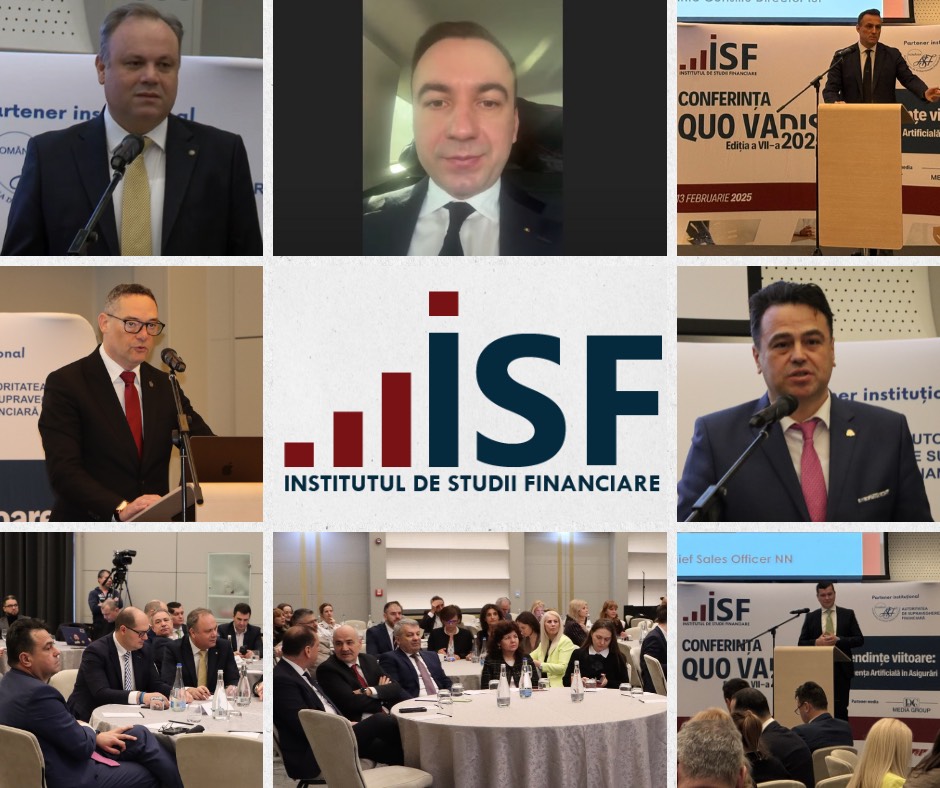The 7th edition of the Quo Vadis Conference, organized by the Institute of Financial Studies (ISF) together with the DC Media Group press trust, with the Financial Supervisory Authority (ASF) as an institutional partner, was dedicated to technology. Under the title “Future Trends - Artificial Intelligence in Insurance”, the event brought together specialists from the insurance market and representatives of authorities. The main conclusion was that the insurance market cannot ignore the unprecedented developments in the field of Artificial Intelligence (AI), but caution and optimal regulation are needed to ensure benefits for the market and consumers.
In this context, Bogdan Ivan, Minister of Economy, Digitalization, Entrepreneurship, and Tourism, highlighted that Romania is one of the countries that have made significant strides toward digitalization.
“Artificial Intelligence is already at an advanced stage of development. We can use this tool if we have the hardware to run it. Romania has it. There are only seven countries in the world that have such a platform,” the official stated, referring to the government cloud that will connect all public services at local and central levels with citizens.
“We have implemented the necessary infrastructure so far. We launched the tender for the migration of public services to the government cloud, and now we are working on an application so that entrepreneurs no longer need to submit the same documents multiple times. It’s a start. We need to talk about standardization and the creation of clear tools. What we have done so far is to take models from other countries and adapt them. Specifically, in the insurance sector, I can tell you that in the government cloud, we will have a single application, an interface for the interaction of the entire public system with citizens,” Mr. Bogdan Ivan elaborated.
In turn, Mr. George Mădălin Borș, Secretary of the Information and Communications Technology Committee of the Chamber of Deputies, discussed the first form of AI regulation in history, introduced at the European Union level through Directive 1689/2024, better known as the AI Act. “Following the analysis of this field, the European Commission classified AI systems based on risks. Several categories have been established, each with marginal chapters. The first is the unacceptable risk category, for which the AI Act prohibits the use of subliminal techniques, the exploitation of vulnerabilities of a specific group of people, social behavior assessment by public authorities, and the use of real-time remote biometric identification systems. Fines for this risk can reach 30 million euros or 6% of the user’s turnover. The second chapter covers high-risk systems, which include eight domains. The third chapter refers to limited-risk tools, such as chatbots, Chat GPT, or Open AI. In this chapter, the purpose of the legislation is to ensure that users are aware of the risks of interacting with AI,” explained Mr. Mădălin Borș.
The Vice-President of the Financial Supervisory Authority (ASF), Sorin Mititelu, stated that the issue of using AI in insurance must be viewed from two perspectives: that of the market and that of the authority. “As far as we are concerned, we have an ongoing project that incorporates, to some extent, this tool called Artificial Intelligence, in a future platform, in a future system for managing ASF’s activities across all three sectors. In practice, we have a project for which the necessary documents have been submitted to access funds for the acquisition and development of an integrated system, a project carried out through the ADR. In other words, we are also trying to keep up with these developments,” stated the ASF official. Regarding its impact on the market, Mr. Sorin Mititelu believes that technology will significantly change the paradigm in insurance, especially in claims management and sales activities. “If you try to find out what you need to do to report a claim, use ChatGPT. In 30 seconds, you have all the necessary information. This is an example of how an AI agent is useful… It’s also a lesson that insurers should learn, about where they need to go to ensure proper service for policyholders,” emphasized the ASF Vice-President.
The President of ISF, Valentin Ionescu, highlighted the clear benefits of using AI in insurance, while stressing that the risks are equally significant. “Artificial Intelligence is no longer a futuristic concept; it is a reality happening around us. It fundamentally transforms the insurance industry, from process automation and policy personalization to fraud detection and advanced risk assessment. Artificial Intelligence offers immense opportunities for efficiency, accuracy, and innovation, but with these benefits come essential challenges related to data protection, algorithmic decision transparency, and equitable access to insurance… Artificial Intelligence brings significant benefits to the insurance industry through efficiency and personalization, but it must be managed carefully to avoid risks related to privacy, dissemination, and potential algorithmic errors that may arise,” concluded the ISF President.
The event can be viewed HERE.

